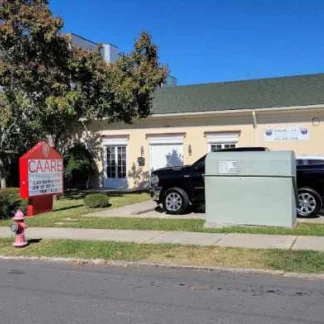Substance Abuse Treatment and Recidivism Reduction - STARR
Substance Abuse Treatment and Recidivism Reduction - STARR is a Non-Profit rehab...
Healing with CAARE stands as a comprehensive substance abuse treatment center in Durham, NC offering community resources to individuals and families. With its roots in holistic care, CAARE addresses health disparities, offers medical services, and provides essential supportive programs.
Healing with CAARE provides various treatment programs including the following:
At the heart of CAARE’s offerings is its dedication to health. They operate a health clinic that offers free medical services, ensuring that members of the community can access quality healthcare irrespective of their financial status. From general check-ups to specialized care, CAARE’s health clinic stands as a testament to their commitment to community well-being.
CAARE offers outpatient treatment for those who need structured therapeutic support but not in an immersive residential setting. This program allows individuals to benefit from therapy, counseling, and group sessions while staying connected to their daily lives and routines.
CAARE recognizes the unique challenges faced by the LGBTQ+ community and thus offers specialized support. Tailored to address both emotional and practical aspects, CAARE provides a safe and inclusive environment where individuals can seek assistance, counseling, and community connections.
Understanding the importance of stable housing as a foundation for wellness and recovery, CAARE has established transitional housing programs. These programs offer a structured environment for individuals transitioning from homelessness or rehab, providing them with the stability and support needed to rebuild their lives.
Healing with CAARE offers various life skills education programs. These programs are designed to equip individuals with practical knowledge and skills, ranging from financial literacy to job readiness.
CAARE understands the importance of ongoing support. Their aftercare programs provide individuals who have completed primary treatments with continued counseling, peer support, and resources, ensuring they maintain their progress and stay on the path to long-term wellness.
Contact us for more information: (919) 683-5300

Connect with Healing with CAARE by calling their admissions team directly.
(919) 683-5300 Website Get DirectionsThe Commission on Accreditation of Rehabilitation Facilities (CARF) is a non-profit organization that specifically accredits rehab organizations. Founded in 1966, CARF's, mission is to help service providers like rehab facilities maintain high standards of care.
CARF Accreditation: Yes
Group therapy is any therapeutic work that happens in a group (not one-on-one). There are a number of different group therapy modalities, including support groups, experiential therapy, psycho-education, and more. Group therapy involves treatment as well as processing interaction between group members.
In individual therapy, a patient meets one-on-one with a trained psychologist or counselor. Therapy is a pivotal part of effective substance abuse treatment, as it often covers root causes of addiction, including challenges faced by the patient in their social, family, and work/school life.
Life skills trainings involve all the skills a person must have in order to function successfully in the world. These include time management, career guidance, money management, and effective communication. Truly successful addiction recovery is based on the ability to not only live substance-free, but to thrive. Life skills teaches the practical necessities of functioning in society, which sets clients up for success in life, and therefore sobriety.
Nutrition therapy, aka medical nutrition therapy (MNT), is a way of treating physical, emotional, and medical conditions through diet. Specific dietary plans are designed by professional nutritionists or registered dietitians, and patients follow them in order to positively affect their physical and mental health.
In individual therapy, a patient meets one-on-one with a trained psychologist or counselor. Therapy is a pivotal part of effective substance abuse treatment, as it often covers root causes of addiction, including challenges faced by the patient in their social, family, and work/school life.
Life skills trainings involve all the skills a person must have in order to function successfully in the world. These include time management, career guidance, money management, and effective communication. Truly successful addiction recovery is based on the ability to not only live substance-free, but to thrive. Life skills teaches the practical necessities of functioning in society, which sets clients up for success in life, and therefore sobriety.
Nutrition therapy, aka medical nutrition therapy (MNT), is a way of treating physical, emotional, and medical conditions through diet. Specific dietary plans are designed by professional nutritionists or registered dietitians, and patients follow them in order to positively affect their physical and mental health.
Life skills trainings involve all the skills a person must have in order to function successfully in the world. These include time management, career guidance, money management, and effective communication. Truly successful addiction recovery is based on the ability to not only live substance-free, but to thrive. Life skills teaches the practical necessities of functioning in society, which sets clients up for success in life, and therefore sobriety.
Nutrition therapy, aka medical nutrition therapy (MNT), is a way of treating physical, emotional, and medical conditions through diet. Specific dietary plans are designed by professional nutritionists or registered dietitians, and patients follow them in order to positively affect their physical and mental health.
Nutrition therapy, aka medical nutrition therapy (MNT), is a way of treating physical, emotional, and medical conditions through diet. Specific dietary plans are designed by professional nutritionists or registered dietitians, and patients follow them in order to positively affect their physical and mental health.
Substance Abuse Treatment and Recidivism Reduction - STARR is a Non-Profit rehab...
Freedom House Recovery Center - Durham Center Access offers outpatient treatment...
Youth Extensions – Durham is a private rehab located in Durham, North Carolina. ...
Carolina Community Support Services is a private rehab located in Durham, North ...